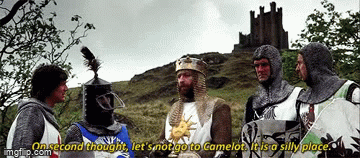Social media is a very silly place
Well.
I have come off of my much-needed staycation. I had numerous plans as to what I would do during my time off. Museums, record stores, long drives.
I did none of them.
The past few months have simply sapped my vim and vigor. I needed ten days of doing nothing. Absolutely nothing. Wake up, have breakfast, take a shower, put on some fresh jammies, and hang out with the Hounds of Love while the missus was at work. Far from considering this a "waste", it was what my body, mind, and soul required. No reading the news. No watching the news. No reading of anything too heavy. No documentaries on the Holocaust. Nothing but allowing myself to heal.
And almost no social media.
I cannot tell you how edifying it's been to not be on social media—for me, the only account I have is on Bluesky. While everyone else has been peering into the Abyss on a daily, hourly, and minute-by-minute basis, I disconnected. I disconnected from the rage bait. I disconnected from the "do something" crowd. I disconnected from "debates".
I'm not saying that social media has no utility whatsoever. But this encapsulates my thinking:
I am a social media OG. I was involved with the BBS scene. I met Mrs. LL on IRC. Yahoo Chat, ICQ? Been there, done that.
What those services had which our latter-day social media lacks was a sense of community, and a strong boundary of what was acceptable. True story: I was a moderator on a sex-chat channel on IRC. (Yeah, don't be so surprised.) Mrs. LL came into the room to troll us, and I kicked her out. Then she messaged me in private, and, well, twenty-five years later here we are.
Disagreements were not viewed as existential. Foreign actors were not sowing dissension and animus as a psychological operation. We spoke to each other the way we would have spoken to anyone in the meat world. We had not gotten yet to this situation:
Of course, that didn't last long. The serpent always gets into paradise. Utopia falls apart. Idealistic communes devolve into anarchy. And with a technology as exponentially evolving as the internet was at that time, it's no surprise that days of free love and free thought soon went by the wayside, as actors realized that the internet was, in fact, the greatest tool humanity had yet invented for manufacturing consent. It replaced religion as an opiate—and, frankly, accentuated all the cultural opiates with which we had sedated ourselves. Rather than opening yourself up to differing viewpoints, the money was to be found in niche spaces where you could find like-minded individuals who would not only not question you, but actively encourage your particular intellectual and moral fetishes. The internet is an amazing tool for organizing; however, it's not just the people you like who are using it to do so. Aside from sex, all new technologies are used to spread hate; the internet was no different.
In social media, the powers that be had found the perfect way to socially engineer people. The Rohingya genocide in Burma was concocted and directed on Facebook. Both white supremacists and Islamist terrorists are radicalized online. No more flyers on telephone poles; now for a fraction of the cost, one can build one's own revolutionary cell.
Here's the thing: we are not automatons. Yes, they want us to think we have no agency, no power. Those are lies. We have the ultimate power which they cannot take away: we can say "no". The first thing you learn as a child is to say "no" to something you don't like. The bane of parents everywhere is, today, our greatest weapon. Say "no" to those who want to drive you into a fever-pitch. Say "no" to those who want you to accept lies as truth. Say "no" to those who want you to sacrifice yourselves for The Cause, while they sit safely away from the consequences.
Again. Log off. Go outside. Touch grass. Don't mistake your online life for real life. We need to rediscover that we are masters of our tools, not their slaves. Once we do that, nothing but good will come.


